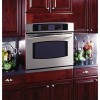GE JT930SKSS Owners Manual - Page 5
Trivection
 |
View all GE JT930SKSS manuals
Add to My Manuals
Save this manual to your list of manuals |
Page 5 highlights
Safety Instructions Operating Instructions Care and Cleaning Troubleshooting Tips Consumer Support ge.com TRIVECTION™ OVEN Read and follow the specific "Precautions to Avoid Possible Exposure to Excessive Microwave Energy" section in this manual. To reduce the risk of fire in the oven cavity: s Do not overcook food. Carefully attend appliance if paper, plastic or other combustible materials are placed inside the oven to facilitate cooking. s In defrost mode, remove wire twist-ties from paper or plastic containers before placing bags in the oven. s Oven Cooking Bags-Do not use the wire twist-tie to close the bag. s Do not use paper towels. s Do not use your oven to dry newspapers. s Do not overcook potatoes. They could dehydrate and catch fire, causing damage to your oven. s Do not operate the oven while empty to avoid damage to the oven and the danger of fire. s Do not use the oven for storage purposes. Do not leave paper products, cooking utensils or food in the oven when not in use. s If materials inside the oven should ignite, keep the oven door closed, turn the oven off and shut off power at the fuse or circuit breaker panel. If the door is opened, the fire may spread. s This oven is not approved or tested for marine use. s Some products such as whole eggs and sealed containers-for example, closed jars-will explode and should not be heated in this oven. Such use of the oven could result in injury. s Do not boil eggs in this oven. Pressure will build up inside the egg yolk and will cause it to burst, possibly resulting in injury. s Do not pop popcorn in your oven. s Foods with unbroken outer "skin" such as potatoes, sausages, tomatoes, apples, egg yolks, chicken livers and other giblets should be pierced to allow steam to escape during cooking. s Don't defrost frozen beverages in narrownecked bottles (especially carbonated beverages). Even if the container is opened, pressure can build up. This can cause the container to burst, possibly resulting in injury. s Hot foods and steam can cause burns. Be careful when opening any containers of hot food, cooking pouches and boxes. To prevent possible injury, direct steam away from hands and face. s As with any appliance, close supervision is necessary when used by children. 5














